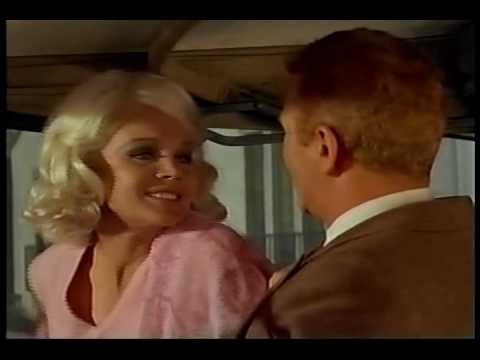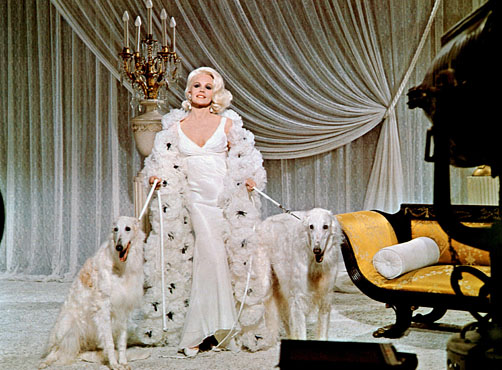This is part of a continuing series on Hollywood show biz bio-pics. The preceding three parts (this, this, and this) focused on bio-pics from the classic studio era. An upcoming post will cover some from the 1970s through the present. In between, this transitional one.
In mid 1965, a rare thing happened: two different Hollywood movies were released which had the exact same title and the exact same subject: the life and career of the original Blonde Bombshell Jean Harlow (1911-1937).
Harlow (released June, 1965)
This film is a stepping stone to the modern era, containing franker attitudes about sex than earlier studio bio-pics, and modern techniques like location shooting and real exteriors (rather than studio sets and back lots). But it is still (despite being based on a biographical book) almost entirely fictionalized. The greater sensationalization makes it feel like many of the films we talked about in part three of our earlier series: I’ll Cry Tomorrow, Love Me or Leave Me, The Buster Keaton Story, The Helen Morgan Story, The Joker is Wild and Jeanne Eagels. In fact it plays VERY like another of our favorite films Valley of the Dolls, released two years later.
In this major Paramount release, Carroll Baker portrays Harlow in a vehicle that seems more geared toward Baker’s own recent screen roles than anything that ever happened in the life of Harlow. Not that Harlow’s life was completely without its tawdry touches. It’s just that this movie feels like Heaven and Earth were moved to tweak Harlow’s life into a suitable follow-up to films like Baby Doll, Something Wild and The Carpetbaggers.
The film takes the oddly prurient position that Harlow was a naif who wished to maintain her virginity, even at the cost of fending off every mouth-breathing wolf who wants to help her career in exchange for sexual favors. Riding shotgun is her fictional manager Arthur Landau (played by Red Buttons) who spouts some gobbledy-gook about how they’ll create a screen character “every man will want but can’t have”. Soundtrack, art direction, hair and costumes all egregiously offend the anachronometer, in roughly that order. The sets often make me feel like I must be watching the Jayne Mansfield Story.
The film starts out with Harlow being cast as a bit player in what are plainly meant to suggest Hal Roach comedies (since that’s where Harlow got her start), but are heavily fictionalized so there are no recognizable comedians, and they’ve been transplanted to the sound era (despite the fact that they’re full of the kind of slapstick gags that were only common in the silent era). The movie also blows off the messy fact that the teenage Harlow had a husband during these early years, thus making all this blather about her being an innocent virgin at the beginning of her career a load of nonsense.
Then she encounters a succession of fictional men. Howard Hughes has been fictionalized into “Richard Manley” (Leslie Nielsen – – and, yes, that is every bit as entertaining as it sounds). Clark Gable (I guess?) has been transformed into “Jack Harrison” (Mike Connors). Louis B. Mayer has become “Everett Redman” (Martin Balsam). The only real-life characters in the film besides Harlow are her mother (Angela Lansbury), worthless Italian stepfather (Raf Vallone), and her husband Paul Bern (Peter Lawford), whom (God forgive me) constitutes the meat of both this and the other Harlow movie, although neither movie quite knows it. Most bio-pics fail because they bite off more than they can chew (God forgive me again). You have a much better play or movie if you simply choose one major crucial incident or phase rather than the entire cradle to grave story. In this case, you’d get such a terrific movie if you just focused on the tragic alliance between Harlow and Bern. (If you don’t already know the legendary story, Bern reportedly proved to be a washout on their wedding night. Gay? Impotent? Intimidated? Asexual? I don’t claim to know the answer, but he was found shot to death shortly afterward, many think by his own hand. The irony: Harlow is the most desired female in the country, and her husband can’t consummate the marriage.
The last act of Harlow’s life in this film is an entirely invented phase where she has a downfall, and becomes washed up, and hurting for money. This never happened. She never had any sort of fall. She was at the top of the industry when she passed away. They also turn her into a drunk, creating a libelous scenario where it looks like she EARNS her early death with debauchery when in fact nothing of the kind happened. For some weird reason the film rewrites her fatal kidney ailment as pneumonia. I hope her ghosts haunts those responsible.
Also Harlow (released May, 1965)
This one, starring Carol Lynley, was actually released a few weeks prior to the other one. We list it second because its production was actually launched after the other film’s, but it was a cheapie made in just a few days, so it was able to be rushed to market ahead of the other one. Also I have seen the other one three times — I saw this one for the first time last night.

Also, this one (IMHO) happens to be vastly superior to the other one. Though it’s clearly a shoestring affair made for a fraction of the other one’s budget (black and white, VERY cheap sets, and above all shot in some short-lived process called “Electronovision”) it does much better on several of the essentials. It gets WAY more of the facts correct (not that that TRULY matters in the entertainment business), and it’s written with a good deal more focus and movement. Where the other film is a soap opera containing numerous scenes featuring people simply talking with no dramatic object of any kind, this one moves along fairly briskly. There are so many rewards in this film. It introduces us to the interesting and true fact that Harlow actually got her start in Laurel and Hardy films. It mentions that first husband. It mentions her first hit movie Hell’s Angels. Things like music and hairstyles are WAY more accurate. Her mother is played by actual 30s movie star Ginger Rogers, which has a kind of nice symbolism, don’t you think? (Barry Sullivan plays the useless Italian stepfather).
The film very cleverly references the raciness of pre-code movies in a way the big budget Paramount production couldn’t even touch. There’s, oh, the bra removal scene. The Gothic blood-spurting-on-the-bust-of-Beethoven scene. And many more requisite bath-tub scenes. Louis B. Mayer is an actual character, as is Marie Dressler. In fact the only major fictionalized character in the film is William Powell, whom has been changed here to “William Mansfield” (Efrem Zimbalist Jr), probably because Powell was still alive (which was probably why he wasn’t he even mentioned in the other Harlow movie). While it was interesting to include him…everything after the Bern suicide seems to overstay its welcome. And once again, Harlow is made to pay for sins she never committed, and dies in another apparently unwarranted oxygen tent. Oh, well
Had enough yet? Wait there’s more —
Hughes and Harlow: Angels in Hell (1978)
But this will have to wait for some later date….
Meantime, for real facts, allow me to recommend the book Platinum Girl: The Life and Legends of Jean Harlow by the infallible Eve Golden.








I adore Harlow; she was directly responsible for my love of pre-Code film. Loyalty kept me from watching any of these, but now I might try the Lynley one. (Might.)
Why was it so hard for them to set a proper fingerwave? 😀
LikeLike
For many decades, everyone seemed unable to think outside the style of their own time. Going outside of it was like, breaking the sound barrier or traveling faster than the speed of light. Going too far outside it was deemed unthinkable
LikeLike